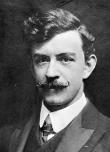Comic opera.
Set in India, the narrative begins when Chunder (the temple-keeper), who has pawned the golden image of the god Shiva, attempts to propitiate the rajah by offering him his beautiful daughter Aimee as wife. However, she is an unwilling proposition, having been smitten by the handsome pilgrim Jengis, who won her affection while impersonating Shiva. The rajah exposes Jengis and orders him to be beheaded, but is foiled by a beggar, who is none other than a disguised emperor. The emperor degrades the rajah and gives the young couple his blessing.
The libretto was written by Souter around 1907, with the rajah as the central comic character. Souter was apparently influenced by The Cingalee at the time, and originally planned to have the rajah close the shrine, pawn off the god, and travel to Paris on the proceeds, instead of going on a pilgrimage. However, the 'White Australia' cry at the time caused J .C. Williamson to reject the idea and never stage the opera.
Some years later, Victor Prince suggested to Souter that the white element be eliminated and that the plot be remodelled on romantic lines. Alfred Hill (who had previously worked with Souter on Tapu, after J. C. Williamson had asked that that the libretto be reworked) was then brought in to compose the music.
The Brisbane Courier's 'Music and Drama' column reported, prior to the Sydney premiere, that the 'comedy is not extraneous, but arises out of the story and is neat and clever (24 November 1917, p.12).
Much of the music is founded on Indian airs and melodies. Some song titles include 'Love, it is a Song', 'The Coughdrop', 'Maid of the Dear Eyes', 'Sad is the Heart', and 'Sword of Mine.'

 4089582935942949095.jpg
4089582935942949095.jpg